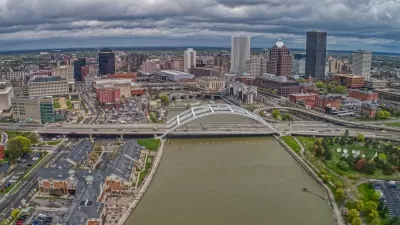Multiple states have ongoing pushes for good cause eviction protections. A frequent obstacle: a now disproven claim by developers.

Advocates for good cause eviction protections, which prevent landlords from evicting tenants without a valid reason, have long faced pushback from developers who claim such laws discourage new construction. However, a new report from the University of Minnesota’s Center for Urban and Regional Affairs (CURA) finds no evidence that good cause policies reduce building permits or housing development.
The study compared counties in states with recently enacted good cause laws — such as California, Oregon, and New Hampshire — to neighboring regions without these protections. After accounting for economic variables, the researchers concluded that good cause policies had no impact on new construction.
Despite this data, resistance persists. In Maryland, where legislation to allow localities to adopt good cause failed to pass this year, opponents have shifted their arguments. Instead of focusing on whether good cause alone hurts development, they now argue that a combination of tenant protections — including rent stabilization and vacancy control — deters investment.
State Senator Will Smith, who played a key role in stalling the Maryland bill, claimed that while good cause alone may not harm housing, its combination with other protections does. However, critics argue that this is an attempt to undermine other tenant safeguards like vacancy control by linking them to good cause efforts.
Meanwhile, in Connecticut and Rhode Island, tenant advocates are using the CURA research to support their campaigns, though with mixed results. In Connecticut, the research helps counter objections but hasn’t shifted the broader debate centered around property rights. In Rhode Island, however, the data has influenced legislative commissions reviewing housing laws.
Advocates emphasize that while public support for good cause laws may come from lived experiences of housing insecurity, policymakers are more swayed by industry claims and developer pressure — despite lacking evidence. The continued repetition of developer narratives in media and politics, even after being debunked, underscores the challenge tenant advocates face in shifting public policy.
FULL STORY: Good Cause Eviction Policies Don’t Hamper Construction, New Research Shows. Legislators Are Still Concerned.

Planetizen Federal Action Tracker
A weekly monitor of how Trump’s orders and actions are impacting planners and planning in America.

Congressman Proposes Bill to Rename DC Metro “Trump Train”
The Make Autorail Great Again Act would withhold federal funding to the system until the Washington Metropolitan Area Transit Authority (WMATA), rebrands as the Washington Metropolitan Authority for Greater Access (WMAGA).

The Simple Legislative Tool Transforming Vacant Downtowns
In California, Michigan and Georgia, an easy win is bringing dollars — and delight — back to city centers.

Albuquerque’s Microtransit: A Planner’s Answer to Food Access Gaps
New microtransit vans in Albuquerque aim to close food access gaps by linking low-income areas to grocery stores, cutting travel times by 30 percent and offering planners a scalable model for equity-focused transit.

This City Will Pay You to Meet Your Neighbors
A North Kansas City grant program offers up to $400 for residents to throw neighborhood block parties.

Commentary: Our Silence Will Not Protect Us
Keeping our heads down and our language inoffensive is not the right response to the times we’re in. Solidarity and courage is.
Urban Design for Planners 1: Software Tools
This six-course series explores essential urban design concepts using open source software and equips planners with the tools they need to participate fully in the urban design process.
Planning for Universal Design
Learn the tools for implementing Universal Design in planning regulations.
Smith Gee Studio
City of Charlotte
City of Camden Redevelopment Agency
City of Astoria
Transportation Research & Education Center (TREC) at Portland State University
US High Speed Rail Association
City of Camden Redevelopment Agency
Municipality of Princeton (NJ)





























